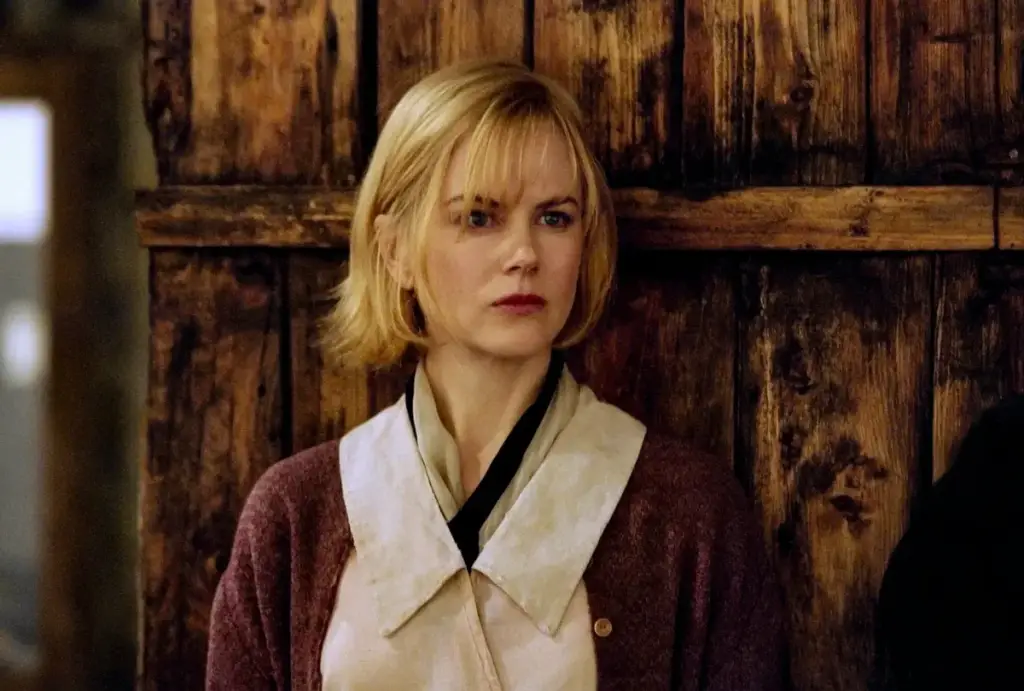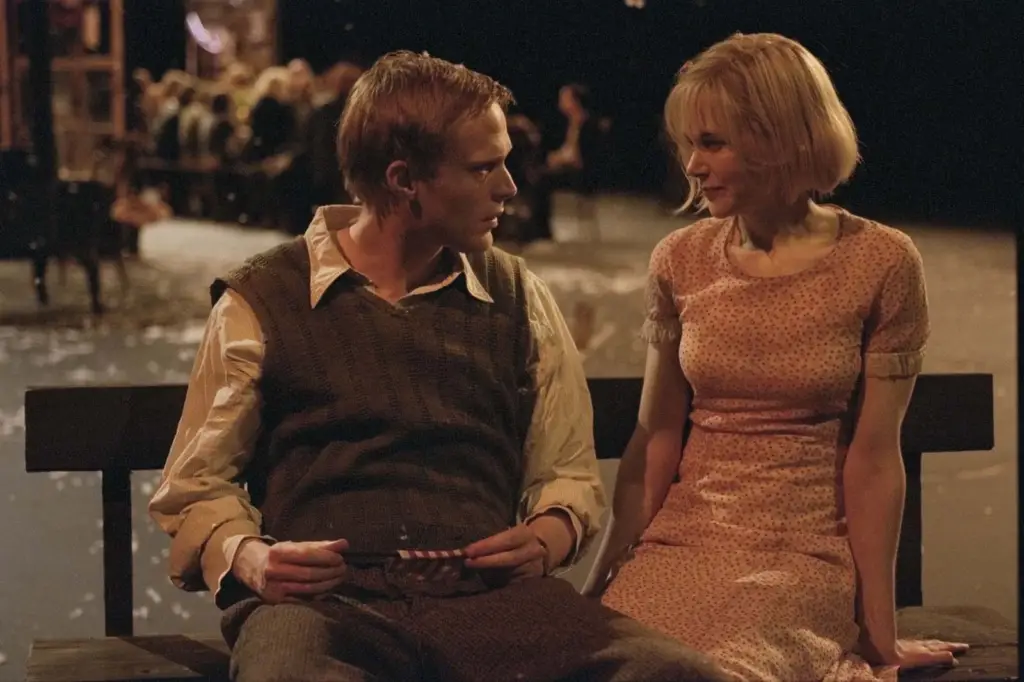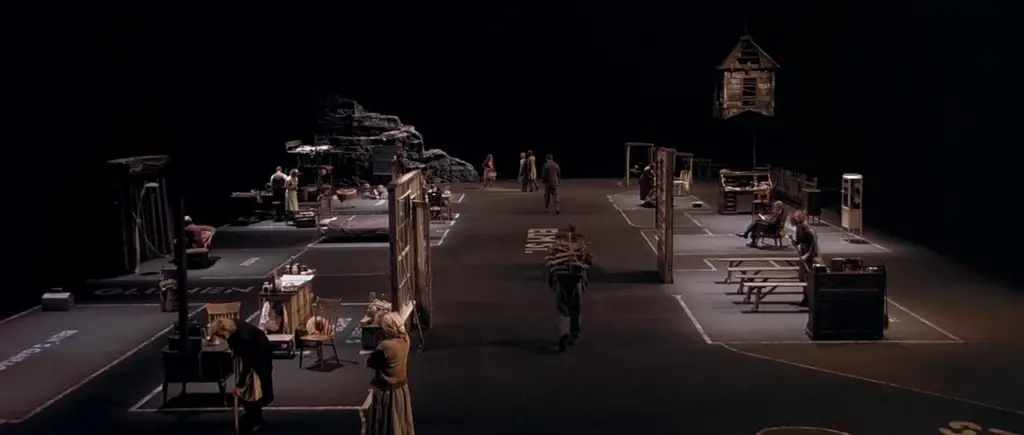Table of Contents
Introduction: Unpacking Dogville’s Impact
Dogville is not just a film; it is a profound exploration of the darkness and complexities that lie within human nature. Directed by Lars von Trier, this unconventional cinematic experience delves into the intricacies of trauma, morality, and the social hierarchies that govern our lives.
In Dogville Explained, we will unpack the psychological and philosophical layers that shape this unique narrative. By examining the characters’ motivations and the moral dilemmas they face, we can gain insight into the darker aspects of the human psyche.
Join us as we explore how Dogville serves not only as a story of personal struggle and redemption but also as a commentary on society itself, revealing the delicate balance between power, justice, and community.

The Psychological Layers of Dogville: Trauma and Human Nature
The Impact of Trauma on Human Behavior
In Dogville, the characters showcase a profound exploration of trauma and its far-reaching implications. The arrival of Grace, a mysterious woman seeking refuge, serves as a catalyst for exposing the hidden psychological scars of the townspeople. Their initial benevolence quickly morphs into a darker portrayal of their instincts when societal norms begin to crumble.
The film prompts a critical look at how trauma can distort human behavior. As the townspeople grapple with their own vulnerabilities, they project their insecurities onto Grace. This dynamic unfolds a chilling reality: when faced with fear or uncertainty, empathy can swiftly erode, revealing a more primal survival instinct. In this microcosm, we observe the unsettling transformation of communal morality when self-preservation becomes the overriding priority.

The Duality of Human Nature
The philosophical inquiry into the nature of humanity is a central theme in Dogville. Lars von Trier juxtaposes acts of kindness with the capacity for cruelty, illustrating the duality that resides within each character. The starkness of the minimalist set reinforces this idea, stripping away external distractions and focusing the viewer’s attention on interpersonal dynamics.
As Grace becomes increasingly exploited, we witness the townspeople’s descent into moral ambiguity. Their justifications for wrongdoing resonate with unsettling familiarity, suggesting that the masks of civility can easily slip when faced with temptation. This portrayal aligns with philosophical theories on human nature, compelling the audience to grapple with the tension between altruism and selfishness.
The Search for Redemption
Redemption serves as a crucial psychological theme in Dogville, particularly for Grace, who embodies both victim and savior. The depiction of her suffering forces the audience to confront uncomfortable truths about justice and forgiveness. Grace’s journey illustrates how trauma can shape one’s identity and moral compass, leading to both despair and, ultimately, the potential for redemption.
In the final act, the nuanced exploration of Grace’s character raises critical questions about the nature of forgiveness. Can one truly find redemption in a world that thrives on betrayal and exploitation? Dogville challenges viewers to contemplate the complexities of moral choices in a context where power dynamics constantly shift.
This tension encapsulates the broader psychological undercurrents of the film, drawing the audience into a deeper understanding of how trauma affects human connections and the drive towards redemption. In unraveling the intricacies of human nature, Dogville leaves a lasting impression that lingers far beyond the credits.
Exploring Nietzschean Philosophy in Dogville: Power, Will, and Morality
The Concept of Will to Power
In Lars von Trier’s Dogville, the Nietzschean philosophy is vividly illustrated through the concept of the “will to power.” This idea posits that the fundamental driving force in humans is not merely to survive, but to exert and enhance one’s influence and capabilities. The film explores this through the character of Grace, portrayed by Nicole Kidman, whose arrival in the isolated town serves as a catalyst for the villagers to project their desires, fears, and ultimately, their cruelties.
Grace’s willingness to serve and help the townsfolk initially highlights their longing for goodness, but as the plot unfolds, her vulnerability allows the inhabitants to exploit her kindness. This evolution encapsulates the darker aspects of human nature that Nietzsche often emphasized—how power dynamics shift when one party recognizes the weakness of another. As the townspeople’s benevolence fades, their true nature emerges, revealing the corrupting allure of unchecked power.

Moral Interpretations and the Übermensch
The moral landscape of Dogville is steeped in ambiguity, reminiscent of Nietzsche’s rejection of traditional morality. The notion of the Übermensch, or “Overman,” serves as an ideal for humanity to transcend conventional moral constraints. Through Grace’s suffering and subsequent transformation, von Trier deftly examines the shifting nature of morality based on power dynamics.
As Grace endures increasingly harsh treatment, the film prompts viewers to question not just the morality of the villagers, but their very humanity. The villagers, convinced of their righteous path, embody Nietzsche’s assertion that morality is fluid and can lead to self-justification of horrific actions. Grace’s character arc ultimately leads her to reassert her own power in a shocking display, challenging the audience’s perception of justice and morality.
Nihilism and Redemption
The psychological depth of Dogville culminates in a struggle against nihilism—the belief in the futility of existence and the rejection of inherent meaning. Nietzsche famously critiqued nihilism, arguing that it arises when individuals abandon traditional virtues but fail to create their own values. In Dogville, the atmosphere is thick with despair and hopelessness as Grace’s initial idealism contrasts sharply with the brutal reality of her existence.
However, her eventual assertion of power marks a break from nihilistic tendencies, suggesting a path towards potential redemption. This climax not only speaks to Nietzsche’s vision of self-creation but also presents the possibility of reclaiming one’s agency, regardless of the oppressive societal constructs surrounding them. In this dark exploration of human nature, Dogville leaves viewers grappling with complex themes of power, morality, and the essence of what it means to be truly human.
The Social Commentary of Dogville: Class, Justice, and Community Dynamics
Class Struggles and Power Dynamics
Dogville serves as a microcosm of societal class struggles, highlighting the intricate dynamics of power and vulnerability. At the film’s core is Grace, a woman who arrives in the town seeking refuge. Initially, her presence is welcomed, as she symbolizes hope and assistance in a seemingly stagnant community. However, as the narrative unfolds, the townspeople’s treatment of Grace reveals the fragility of their moral compasses when faced with socio-economic pressures.
The initial altruism of the townsfolk quickly deteriorates, exposing the fragile veneer of civility. The residents begin to impose their own values on Grace, viewing her as an asset to exploit rather than a person in need. This transition illuminates how power can corrupt individuals and communities, prompting audiences to reflect on their assumptions about class and justice. Understanding Dogville through a psychological lens illuminates the human tendency to dehumanize those who are perceived as ‘other.’

Justice and Moral Ambiguity
In Dogville, the concept of justice is intricately intertwined with personal biases and societal norms. The townspeople view their acts of oppression as justifiable responses to the perceived threat posed by Grace. Their moral frameworks shift, allowing them to rationalize their increasingly heinous actions. This moral ambiguity raises critical questions about the nature of justice itself. Is justice merely a construct shaped by personal convenience and community consensus?
Through the psychological manipulation at play, the film challenges viewers to examine the foundations of their own moral judgments. It cleverly points out how the perception of justice can be easily swayed by the collective fear and prejudices of a community. Dogville intentionally leaves audiences grappling with unsettling questions about guilt, complicity, and the ease with which ethical considerations dissolve in the face of collective interest.
Community Dynamics: Complicity and Isolation
The community of Dogville illustrates the thin line between solidarity and complicity. In the beginning, the townspeople band together to support Grace, creating an illusion of community spirit. However, this camaraderie quickly disintegrates as fear takes root, showcasing how quickly a group can turn against one of its members when urged by self-interest.
This decay of community bonds compels viewers to explore the psychological underpinnings of social isolation and complicity. As characters turn into enforcers of antagonism, they mirror the darker aspects of human nature that prefer comfort over confrontation. The collective identity of Dogville’s residents ultimately becomes a breeding ground for ambivalence, power struggles, and moral decay, serving as a stark reminder of the latent darkness that can prevail within any community.

Visual and Narrative Techniques: How Lars von Trier Tells a Story
The Staging and Set Design
Dogville’s unique staging offers an unconventional narrative experience. Set in a bare soundstage, the film employs a minimalist aesthetic that strips away any distractions. The entire town of Dogville is represented by chalk outlines on the floor, alongside wooden props to indicate buildings and spaces. This deliberate choice encourages viewers to focus on the characters and their actions, rather than on special effects or elaborate scenery.
The stark visual presentation enhances the film’s themes. As we watch Grace (played by Nicole Kidman) navigate the village, the emptiness of Dogville symbolizes the hollowness of its residents’ morality. Through this approach, Lars von Trier effectively uses the visual landscape to deepen our understanding of the psychological complexity within the town. Dogville explained through its set design becomes a profound commentary on societal constructs.

Distinctive Camera Work
Lars von Trier’s use of camera techniques further amplifies the film’s narrative depth. He often positions the camera at an unorthodox angle, creating an intimate sense of voyeurism. By frequently employing close-ups, the audience gets a visceral experience of the characters’ emotions, capturing moments of vulnerability, anger, and ultimately despair.
Furthermore, von Trier’s judicious use of long takes immerses viewers in the unfolding drama. The pacing allows for a slow build-up of tension and discomfort, establishing a rhythm that reflects the narrative’s darker themes. The audience becomes complicit in witnessing Grace’s plight, as each drawn-out moment intensifies the emotional gravity of her circumstances. By manipulating the camera so deliberately, Dogville explained reveals the psychological intricacies of manipulation and power within the trajectory of its characters.
The Role of Narration
Another critical aspect of von Trier’s storytelling is the use of narration, provided by a disembodied voice that sets the tone and context for the narrative. This voice not only guides the audience through the story but also adds layers of irony and commentary. It effectively serves as a bridge between the viewer’s understanding and the allegorical nature of the plot.
This narrative device allows for thematic exploration beyond surface-level storytelling. As the narrator opens and closes chapters, it contextualizes Grace’s journey as one that reflects broader philosophical inquiries into human nature. The detached narration invites the audience to ponder the moral ambiguities and inherent contradictions present in the behavior of Dogville’s residents. Thus, when we think of Dogville explained, the interplay of narration enriches our comprehension of the film’s critique on societal norms and ethical dilemmas.
Book Recommendations: Titles that Echo Dogville’s Themes
Exploring the intricate themes of Dogville, from the depths of human psychology to the shadows of societal norms, can be supplemented by these thought-provoking reads. Each of the following titles offers a unique perspective on the darkness and redemption present in the film, making them perfect companions for understanding its underlying messages.
1. Crime and Punishment by Fyodor Dostoevsky
This classic novel delves deep into the psyche of its protagonist, Raskolnikov, who commits a gruesome crime but struggles with the moral implications of his actions. The exploration of guilt, redemption, and the complexities of human morality mirrors the ethical dilemmas faced by the characters in Dogville.
Buy Crime and Punishment here
2. The Stranger by Albert Camus
Camus’ absurdist novel raises questions about existence and morality through the experiences of Meursault, a man who feels detached from society’s moral codes. The themes of alienation and the search for meaning resonate strongly with the lonely and oppressive atmosphere in Dogville.
Buy The Stranger here
3. The Plague by Albert Camus
Another of Camus’ profound works, this novel presents the human response to an epidemic in a small town, not unlike the insular society depicted in Dogville. It tackles the themes of suffering, compassion, and collective morality, inviting readers to reflect on their own values in the face of adversity.
Buy The Plague here
4. The Trial by Franz Kafka
Kafka’s exploration of bureaucratic absurdity and the dehumanization of individuals within a rigid legal system parallels the injustices faced by Grace in Dogville. The existential themes and the sense of a powerless struggle against an indifferent society present a haunting resonance with the film’s narrative.
Buy The Trial here
5. A Streetcar Named Desire by Tennessee Williams
This classic play examines the fragility of human dignity and the impact of societal expectations on personal identity. The psychological depths of desire, vulnerability, and the harshness of reality reflect the emotional turmoil and societal critique embedded in Dogville’s storyline.
Buy A Streetcar Named Desire here
Conclusion: Reflections on Dogville’s Legacy
In conclusion, Dogville serves as a profound exploration of darkness and redemption that resonates on multiple psychological and philosophical levels. By delving into concepts of trauma, power dynamics, and morality, the film lets us reflect on the complexities of human nature and societal structures.
The stark presentation, devoid of traditional cinematic trappings, reinforces its themes, prompting audiences to confront uncomfortable truths about humanity. Through Dogville explained, we uncover the intricate layers that make this film an essential commentary on class, justice, and the nuances of community relations.
As we step away from the haunting narrative, we are left with lingering questions about our own moral compass and the societal frameworks we inhabit. Lars von Trier’s masterful storytelling ensures that Dogville remains not only a cinematic experience but a lasting philosophical inquiry.
Take a look at all our in-depth reviews here.




